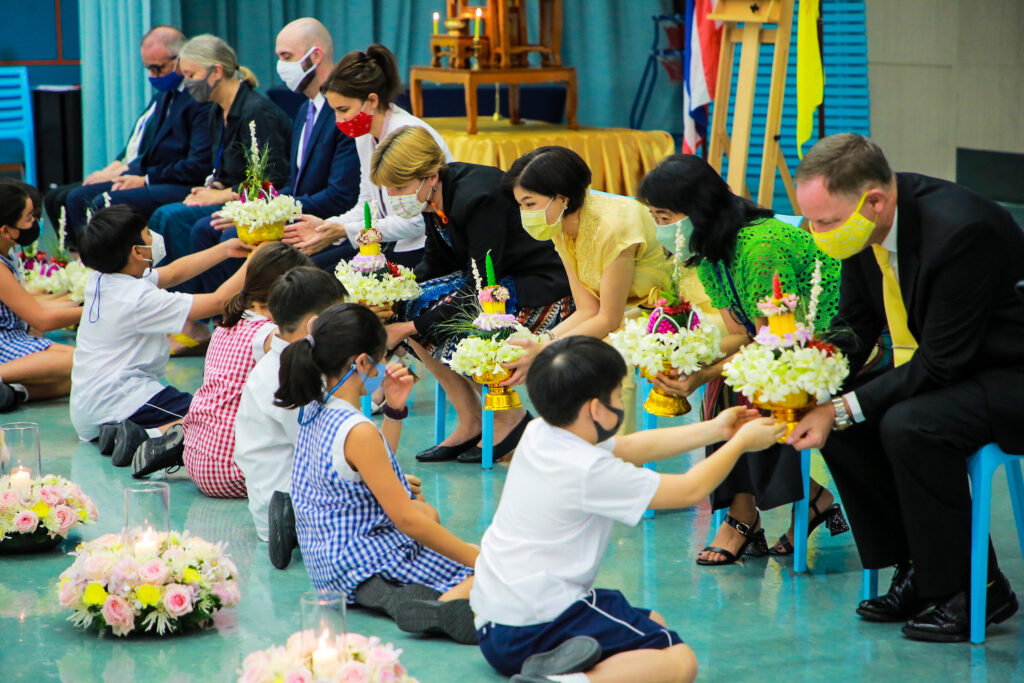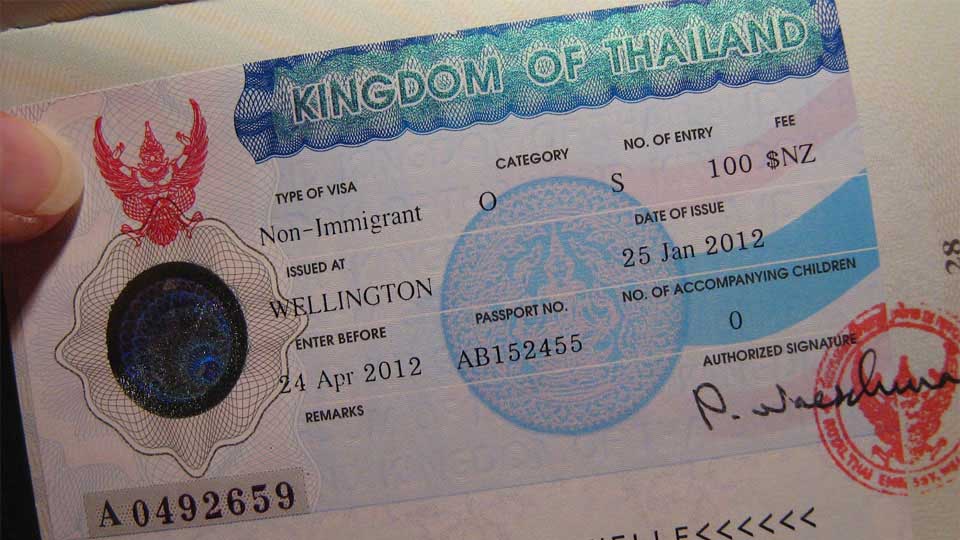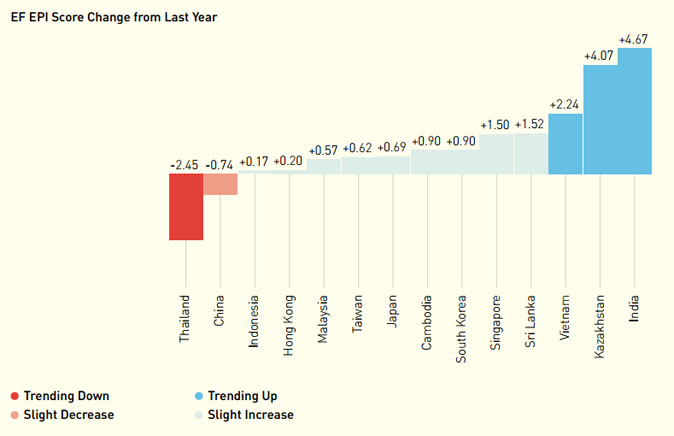If someone asked me,
“Hey, I want to come live and work in Thailand NOW! How can I do this??”
I would tell them,
“No problem! Just come here and teach English!”
Without a doubt, teaching is the most common job for foreigners living in Thailand.
It’s what I did when I first arrived in Thailand and STILL do, over 7 years later.
It has been and continues to be a rewarding experience.
Although I created GoWorkThailand.com to show that there are so many other options available besides teaching, we can’t deny the fact that teaching is certainly the easiest job for most foreigners to get in Thailand.
There are ALWAYS teaching opportunities available for those who can speak English well (and look the part. More on that later).
In fact, there are an estimated 11,000 foreign teachers in Thailand right now.
And it makes sense: Teaching English in Thailand has some definite perks:
1. Fulfillment

It’s a fulfilling job as you quite literally are the window to the outside world for many Thai students.
Not only are you teaching English to your students, you are providing a snapshot into another culture.
You will, in most cases, be the only chance a Thai student has to speak with a non-Thai person.
And as a teacher, you will no doubt have an impact on the lives of many students. Many of these students may even remember you for the rest of your lives!
This thought keeps me going through the tough days of teaching!
2. Truly Experience Thai Culture

Teaching is also a great way to experience Thai culture (both the good and bad!). When you are teaching Thai students all day and interacting with Thai bosses/coworkers, you truly become a part of Thai culture and begin to understand it intimately.
This is a far cry from some foreigners who live in Thailand, but keep to their own little bubble of other foreigners and never truly experience Thai culture beyond ordering Thai street food.
3. Makes Staying here Legally a Breeze

Another huge benefit of teaching English in Thailand is that it allows you to stay for many years legally as all legitimate schools will assist you with getting a work permit/non b visa, etc.
For digital nomads/self-employed foreigners living in Thailand, the visa situation can be a bit more difficult and frustrating.
Certainly not impossible, but it’s harder in most cases.
However, if you are hired at a school and you pass the probation period, you don’t have to worry about the legality of staying in Thailand.
They’ll help you with getting a visa and work permit.
4. So Many Holidays!

One of the absolute best parts of being a teacher here is the amount of days off we get. Of course every school is slightly different, but it’s common to have around 8 weeks of paid time off per year.
And this doesn’t include the NUMEROUS random days off throughout the weeks for various Thai or Buddhist holidays.
When I was living and working in America, it felt like my whole life was my job!
As an English teacher here, you often get so much holiday time that you can pursue your hobbies, travel to new places, or just kick back and relax.
5. Easy to get

Now, there’s a caveat to this point. To get an English teaching job in Thailand you usually need a university degree. Private language centers may accept you without a degree, but for a full on school, usually you need a 4 year degree.
So if you don’t have a degree now, then it may not be easy to get a teaching job here. Still possible, but harder.
But the nice part is, your degree doesn’t have to be related to English or education.
I myself have a degree in business. And I’ve met teachers that have many other degrees such as history, art, foreign languages, and more.
If you can demonstrate you can speak English well (without a thick accent that is difficult for Thais to understand!), have a 4 year degree (in anything), and look the part, you should have no difficulty finding work as an English teacher in Thailand.
Now on to some negatives of teaching English in Thailand
1. Salary

This is going to be quite long because there are so many points to cover here!
And let me preface this by saying that this may not be a negative depending on a variety of factors!
For example, my friend makes a really nice salary as a teacher at over 100,000 baht per month!
But he had years of teaching experience previously, did an extensive training course that gave him qualified teacher status (PGCEI), is a white native speaker from the UK, and was lucky to find a great international school willing to pay huge salaries.
So his high salary of 100,000+ baht per month is not really typical.
But if we are looking at the normal salary for foreign teachers in Thailand, in general, what you will get here is nothing to write home about.
It’s difficult for me to give an exact range because there are so many factors involved in your salary like your country of origin, your level of qualifications, your race (unfortunately), what kind of school you choose, etc.
But here is the general hierarchy:
- Usually you will get paid the most if you are a caucasian looking, native English speaker (NES), with a degree AND qualified teacher status. For example, my aforementioned friend. The salaries may start around 55k – 100k baht per month.
- For a caucasian looking, native English speaker (NES) with a degree, salaries may start around 35k – 45k baht per month.
- Next would be a caucasian looking person with a degree, who is a non-native English speaker (NNES) but speaks English very well. Some schools will even pay them the same amount as a native speaking (NES) white person. So salaries may start around 30k – 40k baht per month.
- And finally would be non white, non-native speakers (NNES) with a degree who are from other countries like the Philippines or India. Salaries may start around 20k – 30k baht per month.
These ranges are simply a starting salary. If you stay with the same school for many years you will usually get yearly salary increases and potentially some bonuses.
And let’s briefly discuss the issue of Non-Native whites getting paid more than Non-Native Non-whites.
It is unfortunate, but this is a reality we have to accept.
If I had to guess the reasons why, I would say it’s twofold:
- Thai parents associate white people with English (even if they are from countries that don’t speak English as a first language) and often will pay more for their child to learn from a white person.
And that’s why schools will pay a higher salary for a non-native white vs a non-native non-white teacher.
- Teachers from the Philippines, India, or other countries are generally willing to accept a lower salary so it drives their salary price down.
So again, it’s an unfortunate situation, but I have met so many Filipino teachers who have made a great life for themselves here and are able to live well, raise a family, buy cars, etc.
To summarize, salaries for an English teacher in Thailand can vary widely, but overall, don’t expect a super high salary.
If you want to be an English teacher and salary is the most important thing, then countries like China, Japan and Korea will typically pay you more.
But if you are visiting this site, then probably there is something drawing you to Thailand beyond the salary.
2. Poor communication

The next negative is in reference to the management style of many Thai bosses at schools.
And of course you will find exceptions, but it has been my experience (and of most English teachers I’ve talked to!) that it is challenging to work with Thai bosses.
It is so normal for foreign teachers to be constantly “out of the loop” having no idea what’s going on!
I can’t tell you how many times there have been activities, events, or deadlines that none of the Thai managers bothered to tell us about, leaving us unprepared and scrambling.
And this even applies to Thai managers whose main job is to manage the foreign teachers!
Somehow they often “forget” to inform us about many things (despite their literal job being to inform us about upcoming events, deadlines, etc).
Whether it’s due to culture, language barrier, shyness, lack of directness, or a combination of these, foreign teachers are often ignored and not communicated with properly.
This poor communication can lead to issues like:
- Foreign teachers getting fired without getting talked to or warned beforehand.
- Frequently not being told about events (or told at the last minute) so we have very little time to prepare.
- A feeling that Thai staff don’t like us because they often avoid talking to us.
- Not knowing how we are doing as a teacher because we usually aren’t given praise or advice to be better.
3. Little upward mobility

Another drawback is that as a teacher in Thailand, there is very little upward mobility. Sure, some teachers may find themselves in small management roles at their schools, but in general, there’s not a whole lot of room for growth for a foreign teacher in a Thai school.
All the “highest” positions will be given to Thai teachers and staff.
So although you will get your yearly salary increases and bonuses if you’re lucky, there’s not much you can do to advance upward to a “higher” position.
4. Very low standard of education

Although rewarding, teaching can be quite difficult in Thailand because the standard is so low. I was shocked when I first came here to learn that scores in Thailand literally don’t matter.
You will have students who come to class, sleep all day, fail all of their tests, don’t submit any homework, yet they move onto the next grade. When I tried to give these students a failing score, my Thai bosses literally erased my score and wrote a passing score for them!
In most countries, this kind of student would be forced to repeat the grade to make up for their lack of effort.
But here, except in rare cases, kids will always move on to the next grade even if they fail in every metric and don’t put in any effort.
So when there is no consequence for Thai students to misbehave, not send work, not study for tests, not listen to their teachers, it can make teaching quite hard.
I’ve had a number of amazing classes that work hard, listen to me, and have great behavior.
But I’ve also had so many classes that are like a zoo!
I think this is because at a certain age, the students realize that they don’t need to work hard to pass onto the next level, so instead of trying in class, they just goof off with their friends instead.
5. Getting Sick A Lot

This point is not necessarily unique to Thailand, but teaching in general.
But if you haven’t taught before, be prepared to get sick…a LOT.
It’s an inevitable part of interacting with hundreds of snotty kids per day, often in an enclosed space where they are coughing, sneezing, etc.
Since becoming a teacher here, I’ve been sick much more often than any other period of my life!
It seems like I’m in a constant state of feeling pretty sick, then mostly recovering (but not completely), then having a short time feeling perfect, then catching something else again!
In conclusion
Teaching English in Thailand has a lot of advantages, but certainly some negatives too.
It’s up to the individual to weigh the pros and cons and make the decision for themselves if they want to teach here or not.
But no doubt, if you are dreaming of moving to Thailand, experiencing the culture, and supporting yourself at the same time, teaching may be just the thing you are looking for.

Comments